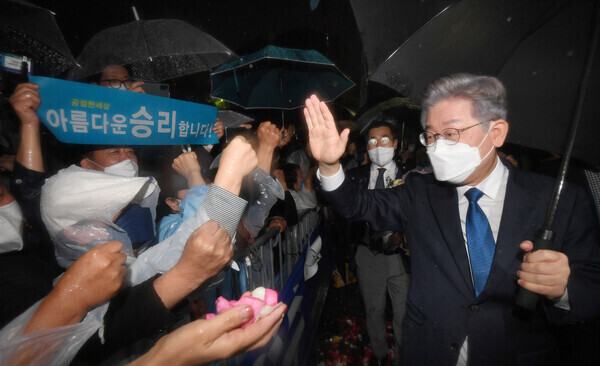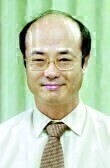[Column] To whom do S. Korea's political parties belong?
전체 맥락을 이해하기 위해서는 본문 보기를 권장합니다.
The political scholar Park Sang-hoon wrote the following in his book "Discovery of the Political Party."
"The political party is the greatest component of modern democracy. Political theorists have played down the importance of political parties. They have conceded parties as a 'necessary evil that must be endured in a free society.' It has taken a long time for a political party to become established as an important institution indispensable for democracy rather than a necessary evil."
이 글자크기로 변경됩니다.
(예시) 가장 빠른 뉴스가 있고 다양한 정보, 쌍방향 소통이 숨쉬는 다음뉴스를 만나보세요. 다음뉴스는 국내외 주요이슈와 실시간 속보, 문화생활 및 다양한 분야의 뉴스를 입체적으로 전달하고 있습니다.


By Seong Han-yong, senior editorial writer
The political scholar Park Sang-hoon wrote the following in his book “Discovery of the Political Party.”
“The political party is the greatest component of modern democracy. Political theorists have played down the importance of political parties. They have conceded parties as a ‘necessary evil that must be endured in a free society.’ It has taken a long time for a political party to become established as an important institution indispensable for democracy rather than a necessary evil.”
In South Korea, it has taken a long time for a proper political party to emerge. Politicians have always come before political parties.
In 1951, President Syngman Rhee founded the Liberal Party in order to keep a long-term hold on power. After rising to power in a coup d’etat in 1961, Park Chung-hee founded the Democratic Republican Party of Korea in 1963. In 1980, Chun Doo-hwan founded the Democratic Justice Party. That is, it was Syngman Rhee’s Liberal Party, Park Chung-hee’s Republican Party, and Chun Doo-hwan’s Democratic Party.
Conservative opposition parties emerged in protest to dictatorship. The Democratic Party was formed in 1955 by members of the Young Korea Academy like Chang Myon and Chyung Yil-hyung, and included independent politicians who had left the Liberal Party such as Hyun Seok-ho and Kim Young-sam. Successors of the Democratic Party include the New Democratic Party, the Reunification Democratic Party, the Peace Democratic Party, the National Congress for New Politics, the Millennium Democratic Party, the Uri Party, the New Politics Alliance for Democracy, and the Democratic Party of today.
These parties were both created and destroyed by individuals with presidential-level powers. President Kim Young-sam, President Kim Dae-jung and Prime Minister Kim Jong-pil were political gods. They had the power to nominate members of parliament and to disburse political funds. Their pawns were the National Assembly legislators who flocked to them.
But the world has changed. No longer do presidential candidates create political parties, and no longer do lawmakers rush to curry favor with them. Let us explore why.
Ownership of political parties has changed. In the past, it was the leader who owned the party; now parties are owned by party members and supporters. National Assembly members are nominated by party members and supporters and even political funds are controlled by party members and their supporters.
After the Democratic Party’s primary, which ended on Oct. 10, the major players now are neither presidential candidate Lee Jae-myung nor former party leader Lee Nak-yon. It is the electors.
Out of an eligible 2.16 million electors, 1.45 million electors cast their ballots to determine the party leader. These figures are astounding. They represent 15,000 elected party members, 700,000 party organizers, and 1.43 million official and unofficial members from the general public. In the first round of the primaries, 640,000 voted; 490,000 voted in the second round; and 300,000 voted in the final round.
Similarly, ahead of the November 5 People Power Party primary election, the leading players are not former Prosecutor General Yoon Seok-youl, Rep. Hong Joon-pyo, former party leader Yoo Seong-min, or former Jeju Gov. Won Hee-ryong. Rather, the main actors are the voting members of the party and the general public responding to opinion polls.
Up until two or three weeks ago, members of the People Power Party firmly believed Yoon Seok-youl to be their presidential candidate. This was because party members from Daegu, North Gyeongsang Province, and older party members saw Rep. Hong Joon-pyo as lacking a competitive edge in a future presidential election.
However, Rep. Hong Joon-pyo has started to take the lead in opinion polls. The People Power Party has found a viable alternative.
The result of the party’s primary election is 50% decided by its members. The People Power Party had 280,000 registered members.
However, since the party elected Lee Jun-seok as its leader in its national convention in June, the party has additionally drawn a whopping 260,000 new members. Among these new members, 43% — or 110,000 people — are in their 20s to 40s. If these voters show up at the polls, former Prosecutor General Yoon Seok-youl could be in trouble.
A neutral member of the People Power Party observed: “As public sentiment is leaning towards Rep. Hong Joon-pyo and with the rise in younger party members, older party members and those in Daegu and North Gyeongsang Province are seemingly starting to worry.” He estimated Hong’s chances of winning at 50%. This remains to be seen, however.
A servant must be loyal to his master. A party’s presidential candidate must be loyal to his or her party members and supporters who helped elect them. Once elected president, the candidate must do their utmost to embody the ideology of their party.
The Democratic Party of Korea represents the interests of the common people and the middle class. Its candidate Lee Jae-myung must represent the interests of the common people and the middle class. His camp for the primaries must be disbanded in favor of an inclusive party camp for the presidential election. Like crossing the ocean on a raft, this is no easy undertaking. However, with its history of holding power three times, the Democratic Party has the wherewithal in terms of policy and politics to pull through this.
In his acceptance speech, Lee vowed to heed the voice of the people in rooting out vested interest groups and reforming politics in Yeouido — where the National Assembly sits. He’s incorrect. He could learn a thing or two from Yeouido politics.
The People Power Party candidate, to be determined Nov. 5, must mobilize all the resources of his party in preparation for the presidential election. The People Power Party has an abundance of manpower.
If former Prosecutor General Yoon wins his party’s nomination and packs the election polling committee with legalists, his grip of power on the People Power Party will be irreversible.
The sovereignty of the Republic of Korea shall reside with its people, and all power shall emanate from the people. The power of a political party shall reside with its members, and all power shall emanate from its members.
Please direct questions or comments to [english@hani.co.kr]
Copyright © 한겨레. 무단전재 및 재배포 금지.
- [단독] ‘손준성 보냄’ 고발장 자료 검색 20분 전 손준성-부하직원 통화
- 민주당 탈당한 20대가 던진 말 “이재명 후보에게 여성은 안 보이나”
- [ESC] 동료 뒷담화, 끼기는 싫은데 안 끼자니 ‘은따’ 걱정돼요
- [영상] “난폭 오토바이, 거기 서세요”…늦은밤 ‘암행순찰차’ 타보니
- [뉴스AS] 윤석열 후보의 1박2일 광주·전남 방문이 남긴 것들
- “윤석열 컨벤션 효과?…여론조사, 양쪽 모두 오판하기 쉽다”
- 돌봄과 가사노동, 함부로 대하는 세상 끝내려면
- [ESC] 환절기 등산복, 두께보다 겹쳐 입기가 중요하다
- 차량용 요소수 확보 예정 물량 2.4개월→5.3개월로 늘어
- 마블? 스타워즈? 오늘 ‘디즈니플러스’ 상륙…뭐부터 볼까